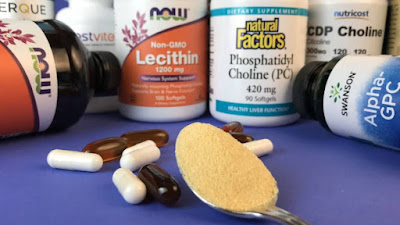Choline Supplements Review 2025
What is choline?
Choline is is an essential nutrient. It is a component of cell membranes and the neurotransmitter acetylcholine, which is essential for proper brain function, and it helps remove fat from the liver. The body naturally produces some choline and the rest can be obtained from the diet, but some people are not able to produce sufficient choline, particularly postmenopausal women and people with certain genetic traits, putting them at risk for choline deficiency. In addition, women need extra choline when pregnant or nursing.Although a small amount of choline is produced by your liver, the rest must be supplied through your diet. Unfortunately, an estimated 90 percent of the U.S. population are deficient in choline (PMC 2009).
- What does choline do? Getting adequate choline from the diet helps prevent fatty liver (which can lead to reduced liver function) and muscle damage. During pregnancy, choline taken by women may reduce the risk of birth defects, and supplementation was even shown to improve infants' intellectual processing speeds. Supplemental choline has shown potential benefit with respect to stroke recovery, cognition, Alzheimer's disease, asthma, and ulcerative colitis (see What It Does).
- How to get choline? Many foods are good sources of choline, particularly egg yolks, meats, and legumes (see Getting It from Food). Lecithin, typically extracted from raw soybean or sunflower seed oils, is also a convenient food source of choline due to the phosphatidylcholine that it contains. Supplements can also provide choline in a variety of forms, including phosphatidylcholine, alpha-GPC, CDP-choline (citicoline), choline bitartrate, and choline citrate. We purchased and tested products containing each of these forms.
- Which form of choline is best? A problem when choosing a choline supplement is that the different forms provide vastly different amounts of choline — and these differences are not clearly labeled. (See Comparison of Choline Ingredients in Supplements). To avoid confusion, we've calculated and shown the amounts of choline expected from the products we tested — as well as whether or not they contained these amounts (see the Results Table).
- How much choline should I take? Adequate daily intake of choline ranges from 200 mg to 550 mg depending on the person (see (see Recommended Intake), but many people get too little. The typical dose used in disease treatment ranges from 50 mg to several thousand milligrams daily of specific forms of choline (see Dosage). We found as little as 19.4 mg to as much as 500 mg of choline per serving in the supplements that we tested.
- Best choline supplement? Most, but not all, products passed our tests of quality (see What CL Found), but only a few represent CL's Top Picks. We also chose an overall Top Pick that provides a form of choline that may be safer and better absorbed than others and is also relatively low cost. We found that you could pay as little at 2 cents to as much as 58 cents to get an equivalent 100 mg dose of choline from supplements.
- Safety and side effects of choline: Choline is generally safe, although gastrointestinal side effects may occur with higher doses. A small percentage of people may develop a fishy body odor from choline. Although cause-and-effect relationships have not been demonstrated, higher intake of choline has been associated with increased risk of colorectal cancer in women, and some forms of choline increase production of TMAO, which, itself, is associated with a higher risk of heart attack. (See Concerns and Cautions).
- Does eating one or two eggs daily increase the risk of heart attack? For most people, an egg a day does not increase your risk of a heart attack, a stroke, or any other type of cardiovascular disease.
In the past, it seemed logical to think eggs would be bad for your heart health. We knew that the cholesterol in eggs came from the egg yolks, and we knew that high levels of cholesterol, especially LDL (bad) cholesterol, in the blood increased the risk of cardiovascular disease. So, it seemed logical that avoiding cholesterol in the diet made sense.
Since then, however, research has shown that most of the cholesterol in our body is made by our liver, it doesn't come from cholesterol we eat. The liver is stimulated to make cholesterol primarily by saturated fat and trans fat in our diet, not dietary cholesterol. But a large egg contains little saturated fat-about 1.5 grams (g). And research has confirmed that eggs also contain many healthy nutrients: lutein and zeaxanthin, which are good for the eyes; choline, which is good for the brain and nerves; and various vitamins (A, B, and D). In fact, just one large egg contains 270 international units (IU) of vitamin A and 41 IU of vitamin D. One large egg also contains about 6 g of protein and 72 calories.
- The evidence that cholesterol in one egg a day is safe for most people comes from huge studies-many conducted here at Harvard Medical School-that have followed hundreds of thousands of people over decades. They regularly report what they eat and all of the medical conditions that they develop. It is those studies that do not find higher rates of heart attacks, strokes, or other cardiovascular diseases in people who eat up to one egg per day.
Of course, it matters greatly what you eat with your eggs. The saturated fat in butter, cheese, bacon, sausage, muffins, or scones, for example, raises your blood cholesterol much more than the cholesterol in your egg. And the highly refined "bad carbs" in white toast, pastries, home fries, and hash browns may also increase your risk of heart disease, stroke, and other cardiovascular diseases.
Related: You Are Likely Deficient in Choline@dr.kevin.reese Everything has a root cause…
♬ original sound - Dr. Kevin Reese, PhD, PAS, DS
Read More: Choline series

.png)

.png)




.png)

Comments
Post a Comment